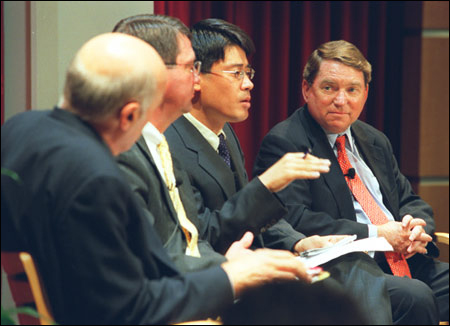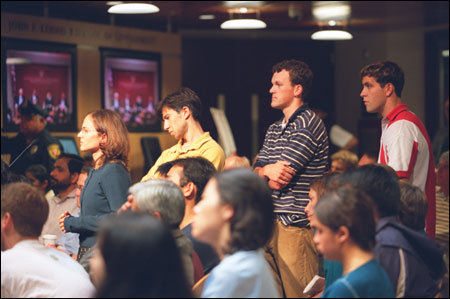IOP forum casts light on future of Korea:
Focus is on U.S./Korean relations

The title of the Institute of Politics Sept. 23 forum discussion “Will the Korean Nuclear Crisis Lead to War?” promised to throw light on a subject that has kept much of the world in a state of anxiety ever since it was revealed in October 2002 that North Korea had resumed its nuclear weapons program in violation of a 1994 agreement.
And if anyone possessed the requisite expertise to provide an authoritative answer to this question, it was the four scheduled panel members: Sung-Joo Han, South Korea’s ambassador to the United States; Thomas Hubbard, U.S. ambassador to South Korea; Ashton Carter, professor of science and international affairs at the Kennedy School of Government (KSG) and a former assistant secretary of defense for international security policy; and moderator Joseph S Nye Jr., dean of the Kennedy School and a former top official in both the State and Defense departments.
But perhaps to no one’s surprise, the most that could be inferred from the discussion on the question of war between the United States and North Korea was a cautious “not yet.”
Unfortunately, the forum was deprived of one valuable perspective due to the absence of the South Korean ambassador, whose flight to Boston was delayed by Tuesday afternoon’s violent rainstorm. Ha-Won Lee, a journalist on South Korea’s leading paper Chosun Ilbo and a KSG research fellow, stepped in at the last minute. But while Lee was obviously knowledgeable about Korean politics, his inability to speak on behalf of government policy weakened his presentation.
Should the United States stage a pre-emptive strike against North Korea and “take out” its illegal nuclear reactor? Carter spoke about this option from a chillingly real perspective. As a Pentagon strategist in the 1990s, he had helped design such a plan.
“We were confident that in one night we could eliminate the threat, but the result would be a million-man army in the DMZ [Demilitarized Zone], artillery fire on Seoul, and possibly missiles launched against Japan and other targets. We believed we could destroy North Korea’s armed forces in a few weeks, but at terrible cost. Tens to hundreds of thousands of people would be killed, and it would shock the conscience of the world.”
But horrifying as such a war might be, letting North Korea “go nuclear” was not a viable option either, Carter said. North Korea might conclude that it had “tipped the balance of power in the region,” with possible disastrous results.

A nuclear North Korea is even less acceptable today, Carter said, because in the aftermath of 9/11 we must also confront the possibility that Kim Jong-il’s government will sell these weapons to terrorist organizations.
This left the option of negotiating with the North Koreans, a process that Hubbard said is still in its preliminary stages. One obstacle to meaningful negotiations is that North Korea’s intentions are still unclear, but to the extent that they can be discerned, the Bush administration finds them unacceptable.
“North Korea has a choice between nuclear weapons and the benefits of being part of the international community,” said Hubbard. “I think they want both.”
Carter interpreted the prospects for negotiations more optimistically.
“We haven’t put any carrots on the table, but we haven’t put any sticks on the table either. We’ve essentially had no relations with North Korea for the past 50 years. We’ve taken away everything we can, and we’re not prepared to give them anything. We have a lot of leverage we haven’t used yet.”
What the North Koreans most want from the United States, Carter said, is assurance that they will not be our next military target, that we will not preemptively attack their country as we did Iraq.
According to Hubbard, North Korea is safe from immediate attack.
“No one in authority in the United States government is considering military options,” he said. “North Korea can see what happened in Iraq, but no one is contemplating the same course of action in North Korea. We are determined to deal with this in other ways.”
According to Hubbard, the United States is prepared to negotiate with North Korea, but it will not accept an agreement that simply trades assurances of non-aggression for a promise by North Korea to dismantle its nuclear weapons program.
“We’re concerned with human rights and other issues,” he said. “We’d like to launch a process that leads to a deal.”
But what if in the meantime North Korea does develop nuclear weapons? Nye asked. Can we blockade the country and effectively prevent the weapons from getting out?
Carter replied that uranium-based nuclear weapons can be made small enough to fit in a suitcase and that it would be impossible to keep North Korea from exporting them.
“It’s an absolute fantasy to suppose you can keep North Korea from exporting nuclear weapons. If that were true, we’d have won the war on drugs.”




